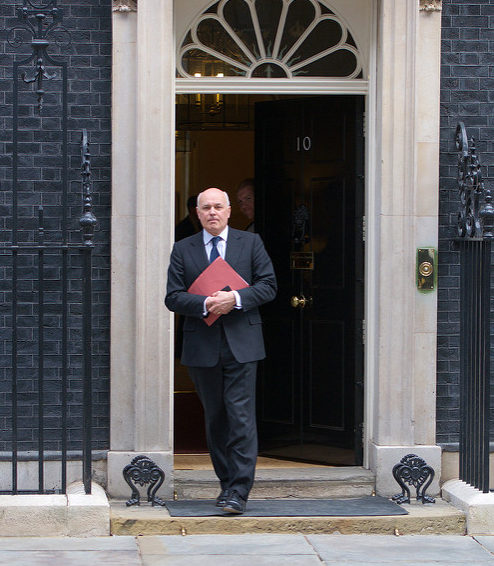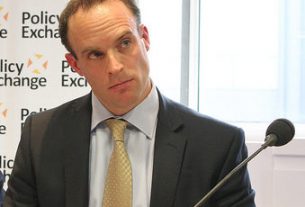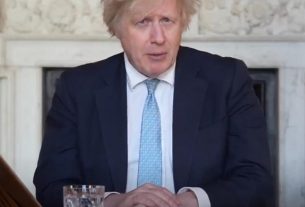Rebel Tory MPs seeking to oust Theresa May were still struggling to get enough letters to force a confidence vote on her leadership today.
The Prime Minister would face a mandatory vote if 48 of her MPs wrote letters of no confidence to Sir Graham Brady, chairman of the back bench 1922 committee.
But despite predictions from Tory Brexiteers on the European Research Group (ERG) that the threshold would be reached within days, they are still short of their target.
Sir Graham has refused to say exactly how many letters he has received, but 26 MPs have so far confirmed they have submitted one.
Even if a secret ballot was triggered, a majority of the 315 sitting Tory MPs would have to desert Mrs May for a leadership election to be called.
If that happened she would be barred from running, but if she survived the no confidence vote, her leadership could not be challenged for another 12 months.
Sir Graham admitted to the BBC’s Sunday Politics North West programme that Mrs May was “very likely” to win any vote of no-confidence.
The last Conservative leader to be unseated in a no confidence vote was Iain Duncan Smith in 2003.
Unrest over the Prime Minister’s conduct of the Brexit process began when her controversial ‘Chequers plan’ was agreed by the Cabinet in summer.
That turned to open rebellion from many Tory MPs last week when details of her proposed withdrawal agreement with the EU was announced.
Brexiteer Jacob Rees Mogg told an audience at the launch of the ERG’s Brexit proposals that if MPs failed to oust her now their chance could be lost.
He said Mrs May would be safe until the 2022 general election after admitting that not every Tory MP who had promised to submit letters had done so.
After a journalist at the Westminster event asked him if the coup attempt was a ‘Dad’s Army’ operation, he replied: “I’ve always admired Captain Mainwaring.”
Mrs May’s draft Brexit deal lays out the terms under which the UK would depart the EU on March 29 next year.
It covers the UK-EU relationship during the Brexit transition period, the size of the divorce bill to be paid by the Government and other issues such as citizens’ rights.
Critics say the withdrawal deal leaves the UK tied to the EU without voting rights, having to accept new laws and also pay a huge departure bill.
A Northern Ireland ‘backstop’ would be put in place aimed to preventing a hard border with the Republic in the event of no long-term trading deal being agreed.
This would keep Northern Ireland more closely aligned to some EU rules than the rest of the UK, something the DUP say is unacceptable.
The UK would not be able to exit the backstop without the agreement of the EU and that has enraged hard Brexiteers.
Ministers from the 27 EU member states are to meet on Sunday for a special Brexit summit on the proposed deal.
The letter writers
These are the MPs who are believed to have submitted letters so far. They have either confirmed this to journalists or on social media:
- Andrea Jenkyns (Morley and Outwood)
- Andrew Bridgen, (North West Leicestershire)
- Philip Davies (Shipley)
- James Duddridge (Rochford and Southend East)
- Anne Marie Morris (Newton Abbot)
- Laurence Robertson (Tewkesbury)
- Jacob Rees-Mogg (North East Somerset)
- Nadine Dorries (Mid Bedfordshire)
- Simon Clarke (Middlesbrough South and East Cleveland)
- Steve Baker (Wycombe)
- Henry Smith (Crawley)
- Maria Caulfield (Lewes)
- Sheryll Murray (South East Cornwall)
- Lee Rowley (North East Derbyshire)
- Martin Vickers (Cleethorpes)
- Peter Bone (Wellingborough)
- Adam Holloway (Gravesend)
- Mark Francois (Rayleigh and Wickford)
- John Whittingdale (Maldon)
- Ben Bradley (Mansfield)
- Chris Green (Bolton West and Atherton)
- Marcus Fysh (Yeovil)
- Zac Goldsmith (Richmond Park and North Kingston)
- David Jones (Clwyd West)
- Sir Bill Cash (Stone)
- Philip Hollobone (Kettering)




